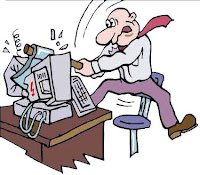
A fascinating discussion about singing in church has been developing on +Nick Baines blog on
Girly music. One of the points that he makes and is picked up in the comments is that we no longer make use of the Psalms in worship. I have to confess that I was almost put off the Psalms for life after my experience as a choir boy having to chant my way through the Psalter at Evensong. I do try and read the Psalms regularly as part of my devotions and this morning it was
Psalm 21. Because the discussion about psalms was in the back of my mind I paid particular attention to the words, rather than simply rattling them off which is often the danger.
I found myself feeling very uncomfortable saying:
Your hand will find out all your enemies; Your right hand will find out those you hate.
You will make them as a blazing oven when you appear.
The Lord will swallow them up in his wrath; And fire will consume them.
You will destroy their offspring from the earth, And their children from among the sons of men. Psalm 21:8-10
Do I really want to use such words in worship of God? Do I want my children expressing such sentiments let alone using them to praise God? This does raise for me the important point that if we are going to recover our use of the Psalms in worship then we had better make sure we have some good teaching to accompany their use. It is simply no good suddenly getting the psalms out one day in church and chuntering our way through them. We need to explain and explore why these ancient songs can resource our worship today.
A few days ago I flicked through a booklet entitled Discovering The Lord’s Song by Anne Harrison. Her argument is ‘that congregational song in particular and Christian worship more broadly are impoverished without the singing of Scripture (and especially psalms) in some form on a fairly regular basis’. I found this a helpful little book exploring why it matters and why we should make the effort, though I felt these sections could have been longer. However, its real worth is in the practicalities of using the songs of Scripture in worship; the when and how questions. The booklet is also punctuated by very useful lists of resources from Taize through to selected choral resources. It’s well worth the £3.50, provides a good introduction to the subject and is a helpful reminder to those of us who have come to take the Psalms for granted.
A couple of quotes cited by Anne provide some food for thought:
The psalms ‘are inexhaustible, and deserve to be read, said, sung, chanted, whispered, learned by heart, and even shouted from rooftops. They express all the emotions we are ever likely to feel, including some we hope we may not, and they lay them, raw and open, in the presence of God.’ Tom Wright Simply Christian.
‘Words and music did for me what solid, even rigorous, religious argument could never do, they introduced me to God, not belief in God, more an experiential sense of God. Over art, literature, reason, the way in to my spirit was a combination of words and music. As a result, the book of Psalms always felt open to me…’ Bono Canongate’s Book of Psalms.
By the way, did you know that Graham Kendrick is listed by grumpy not so old man Quentin Letts in his book
50 People Who B******d Up Britian? Mind you, he also lists Sir Alex Ferguson so he clearly doesn’t know what he is talking about.
 Woke up this morning to the sound of a rushing mighty wind and tongues of flame outside the bedroom window; it’s Pentecost! Turns out the Holy Spirit hadn’t descended on the house but a Virgin hot air balloon had. These balloons are frequent visitors and occasionally one comes down very low over the fields, always a bit risky given the phone lines and power cables.
Woke up this morning to the sound of a rushing mighty wind and tongues of flame outside the bedroom window; it’s Pentecost! Turns out the Holy Spirit hadn’t descended on the house but a Virgin hot air balloon had. These balloons are frequent visitors and occasionally one comes down very low over the fields, always a bit risky given the phone lines and power cables.











 Rosalind Hore
Rosalind Hore.jpg)
 Henry Shelton
Henry Shelton.jpg) Colin Burns
Colin Burns.jpg)


